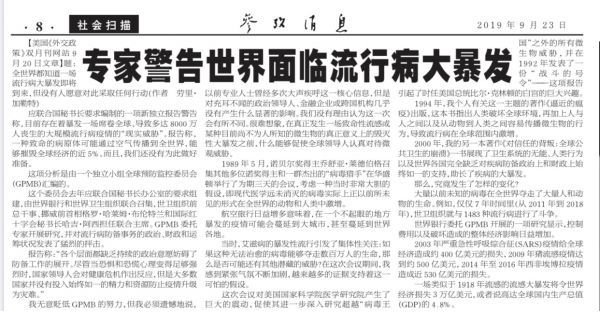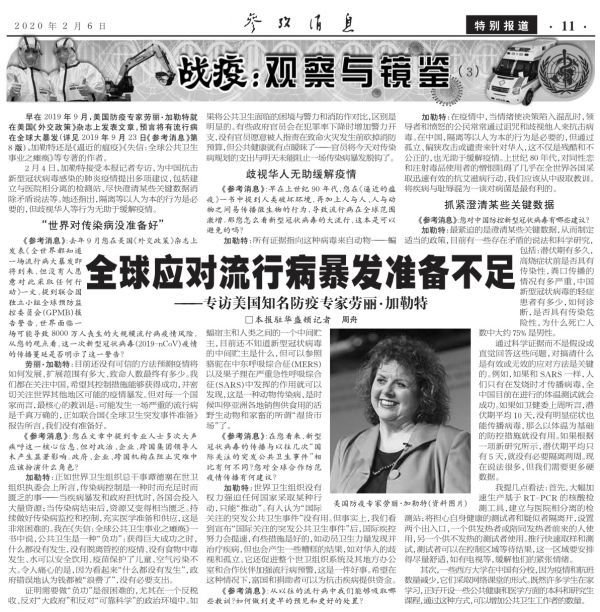 As the new crown virus raged, an article that had predicted "a global epidemic" would be revisited.
As the new crown virus raged, an article that had predicted "a global epidemic" would be revisited.
In this article originally published in the 8th edition of "Reference News" on September 23, 2019 (transferred from the US "Foreign Policy" magazine), a series of questions about whether and how the world can respond to a major epidemic Related issues have been raised one by one.
In the era of globalization, how long does it take for a virus-borne infectious disease to become an epidemic?
Answer: 36 hours.
Can human civilization, which has evolved into the 1920s, be able to calmly cope with such a large-scale infectious disease?
Answer: No, the world is far from ready for this.
This is not alarmist talk, not even speculative remarks, but a scientific conclusion made by U.S. epidemic prevention expert Laurie Garrett on September 21 last year.

▲ As early as last September, "Reference News" warned of the possibility of large-scale infectious diseases with a large-scale layout. The picture shows the 8th edition of "Reference News" on September 23, 2019.
Prophecy: "Worried about the possibility of a new disease"
Who is Laurie Garrett?
In the face of this problem, you may find that, although widely regarded as an epidemic prevention expert in China, it is difficult for you to summarize this American woman who is also engaged in epidemic research, writing and news reporting with a specific label.
After receiving a bachelor's degree in biology in 1975, Laurie Garrett entered the University of California, Berkeley to study bacteriology and immunology. She also conducted scientific research at Stanford University. At the same time, she began to explore scientific reporting and documentary production. In addition, In addition to holding public positions such as a former senior researcher on global health issues at the Committee on Foreign Relations of the United States, she is also the author of monographs on Approaching Plague and Dishonesty: Paralysis of Global Public Health.
But Laurie Garrett's name is now seen and remembered by many Chinese people, and it is still due to the nearly prophetic article published in the US Foreign Policy magazine last September, which was reproduced in the "Reference News".

Based on the first annual report issued by the Global Disaster Preparedness Supervision Committee, Laurie Garrett at the time pointed out that the world's readiness for a medical emergency is not encouraging.
"Although we think of epidemics as catastrophic scenes like those in doomsday movies, far from our daily lives, in fact, we often experience them, such as the flu that happens every year. The flu proves that the disease is worldwide How easy it is to spread, and how complicated it is to control the spread of the disease once it begins to spread, "wrote Laurie Galle.
She went on to point out: "What is more worrying is the possibility of a new disease", and in the face of all this, the global health community is far from ready.
"The response to a potential epidemic should be systemic and start with funding to strengthen health systems in the poorest countries." Laurie Garrett suggested at the time.
"The world is not ready for infectious diseases"
On February 4th, Garrett was interviewed by a reporter from Reference News (for the full text of the article, see the 11th edition of Reference News on February 6, 2020, special planning: Special report on "War Epidemic: Observation and Mirror") (Li Garrett).
In the interview about the article in September last year, Garrett once again reiterated to Xiao Rui the severe situation of epidemic prevention facing China and the world.

▲ The picture shows the 11th edition of "Reference News" on February 6, 2020
"We are all concerned about China, hoping that its control measures will be successful and pay close attention to possible outbreaks in other parts of the world. But for each country, the core lesson is that a serious epidemic could happen. Sure enough, as the UN Global Health Preparedness report states, we are not ready, "Garrett said.
In a conversation with the reference, Laurie Garrett highlighted China's current efforts to fight the new coronavirus, and she made a number of recommendations for China to fight the pneumonia epidemic of new coronavirus infections, including establishing a Separate testing stations, clarify some key data as soon as possible, and eliminate contradictory statements. She also pointed out that human-centered behaviors such as quarantine are necessary, but discriminatory behaviors such as Chinese will not help alleviate the epidemic.
In conjunction with the first outbreak of the new coronavirus outbreak in Wuhan, Garrett also pointed out that all evidence points to an animal infectious disease, so it is time to stop selling live wild animals and livestock for food throughout Asia. The so-called "wet goods market".
When reporters asked what suggestions for China ’s defense against new coronavirus, Garrett emphasized in particular: The most urgent thing is to clarify some key data so as to formulate appropriate policies to eliminate the current contradictory statements and answer the outside world with practical research. Questions, such as how long is the incubation period, whether it is infectious before the symptoms of high fever, how serious the fecal-oral transmission is, how many mild patients with the new type of coronavirus in China, how to diagnose it, whether it is dangerous to infect, and why the number of deaths is male. Wait a minute ...
Facing the epidemic in Wuhan, global experts have something to say
In fact, it's not just Laurie Garrett.
In these days when the new coronavirus is raging, "Reference News" gathers the strength of journalists from abroad to visit public health experts and organizations in many countries to try to provide more professional advice and lessons for China to fight the epidemic.
For example, Professor John Ashton, an authoritative public health expert in the United Kingdom, said in an interview with Xiao Rui that letting professionals trusted and respected by the public to pass on information to everyone is the best way to avoid social panic.
The expert who promotes a coordinated public health approach to violence prevention in the UK believes: "By providing up-to-date and accurate information to inform people about what is happening, people need to know the information to address concerns."
And Zhang Zuofeng, deputy dean and senior tenured professor of epidemiology at the University of California Los Angeles School of Public Health, said in an interview with Xiao Rui in Los Angeles on February 1 that Hubei is one of the most important pneumonia epidemics against new coronavirus infection. Seriously, if the number of confirmed and suspected cases in Hubei is not reduced, the situation of epidemic prevention and control in the country will not see an inflection point.
In addition, Zhang Zuofeng further gave practical suggestions: if effective isolation of diagnosed and suspected patients is urgent, it is also recommended to protect the healthy and high-risk groups and restore and improve the basic functions of cities in the "closed city" area Strive to ensure that vulnerable groups such as the elderly, pregnant women, and children seek medical treatment.
This virus will come and go over time and it is how the government handles the process that matters.
中国政府目前,对疫情严重区域,实行封城,如武汉,其他区域,也已做好相对措施,如工厂延迟开工,全国学校延迟开学,来共同抵制疫情进一步的扩散